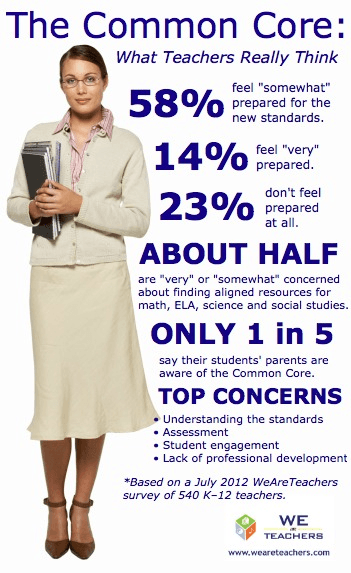Common Core Standards – A bit of History
We all know that 45 states in the U.S. have adopted the Common Core Standards, the defacto “national” standard now.
It is not the first time the Common Core Standards were developed or introduced. It began as an accountability initiative in the 1990s by State Governors and corporate leaders as a laudable effort to raise academic standards.
The trouble was, it never resulted in any measurable improvement in raising the standards across the nation. So, what happened?
The reason is that while many states adopted versions of the standard, they created their own tools to demonstrate compliance with the Common Core Standards. There was no ultimate governing body to oversee implementation or to evaluate if everyone did everything as they were supposed to be intended.
We cannot blame the teachers. They did what they could with limited resources and still be compliant with state-specific norms.
In short, what was created earlier was not commonly used across the U.S., was not the core philosophy guiding teaching principles, and certainly was not the standard of teaching practice.
They should have been called the uncommon peripheral suggestions!
Until now.
So, what’s different about the Common Core Standards this time around?
They really are the common-core-standards!
Here’s how.
Common – because 45 states have entirely adopted a single view of the standards. It’s like agreeing to speak a common language in every subject, from math, to language arts, to social studies. Teachers can now teach math concepts using the same language – terms, words, concepts – that is pretty much universally understood and accepted. Now, when a teacher in New Jersey wants to get clarification on an algebra topic, she can use the common language given in the standards to converse with another teacher in California. The algebra topic (or kindergarten math concepts, or calculus topic) is the same everywhere!
Core – because it is the foundation, the bedrock on which America will once again become competitive in math. Giving our students a solid foundation in whole numbers, elementary school math like addition, subtraction, multiplication, division, fractions, and decimals, geometry, algebra, calculus, and quadratic equations, means that our students will be able to compete on a global level.
As a math student learns these concepts thoroughly, he or she can use them as building blocks to learn more challenging concepts, like differential equations, as they progress. Our students will once again reach the same levels of proficiency that the world has come to expect from students in Singapore and Sweden.
If you have a foundation that is a mish-mash of many things, it is neither strong nor stable and prone to repeated Band-Aid fixes. That’s not the type of foundation you want to build your math curriculum on. It is also based on Singapore Math, because students in Singapore have consistently ranked at the top in international math competitions.
As they say, imitation is the sincerest form of flattery – and we need to adopt the very best practices for teaching difficult concepts in math that others have found to work successfully. This is the only way that our students will be ready to compete on a global level with their peers in other countries. STEM education is important for a reason—because so many of the world’s future jobs and vocations will have a basis in science, technology, and math.
Standards – because they define the what, the how, and the why of teaching math skills and help students across the U.S. use standards that have the same rigor, coherence, and focus across the nation. Rigor is needed to ensure preparedness for taking on complex math topics later on in life.
Coherence means that they are logically structured so that students understand why they learn to add before they can encounter multiplication problems. By the same token, they will understand why they need to learn geometry before progressing to calculus. Focus means that students can understand the linkage between concepts and how they apply to real-world problem-solving. Who among parents hasn’t heard the classic refrain, “But I’ll never use this in real life”? Now, our math teachers are empowered to explain to their students exactly how they’ll use those math concepts in real life. That math problem may look like a bunch of numbers on a whiteboard, but it’s all a language. It’s how physicists understand space and time, how we calculate the cost of our groceries, how biologists track the health of a species in the wild.
This is math nirvana – if one ever existed! Hallelujah.
This is the first time in the history of U.S. classroom education, that the nation has come together to address a foundational problem with the intellectual rigor that it deserved. More importantly, our teachers finally got what they have been asking for all along – a road map that they can rely on for doing their work efficiently and effectively to help teach math to the millions of students who go through our school system.
Until now, it was easy to blame someone else, because someone else deserved to be blamed. The system was faulty. It was messy. It was poorly conceived.
Not anymore.
Thinkster’s online math tutoring program is based in helping your student understand these foundational math concepts, no matter their grade level. From kindergarten and elementary math to calculus and SAT math, Thinkster’s online math tutors and tutoring service can help your child understand Common Core math, succeed on their standardized test, and even get math homework help as needed.
If your child is in need of a math teacher turned private tutor who offers interactive whiteboard sessions, one-on-one sessions, and all in an online math tutoring format, Thinkster can help. Our math tutors are all experienced math teachers who can help your child learn concepts in geometry, SAT math, the quadratic equation, and any other math subject that your student is struggling with.
How do we find the right online math tutor for your child? Since we specialize in online math tutoring, we know how to find math tutors who know how to optimize your child’s math learning in an online format. To be a Thinkster online tutor, you must be not only an experienced math expert and educator, you must also be committed to helping a child learn to think—since, after all, that’s the foundation for math and every other subject your child learns in school.
How do you know whether online tutoring with an expert tutor is right for your child?
If your child is struggling with math homework, a tutoring session, or several, could be exactly what they need to succeed. When they understand that math problem that’s been giving them trouble in math class, their confidence will soar, making the next math class easier for them. As they continue to develop in their understanding of mathematics with the help of an expert math tutor and all the math help they need, their next math lesson will be easier—and that progress will continue.
Thinkster’s online math tutors don’t only address your child’s math skills. They also focus on building your child’s academic confidence, which will help them succeed in every other learning area, too. We’re called Thinkster for a reason: because we believe that the most important thing to teach a child is to learn how to think critically, so they’re ready to take on the challenges of the 21st century.
Think of our math tutors almost as more of math coaches. They’re there to explain difficult concepts in a way your child can understand, but also to cheer them on as they learn new skills. Our tutors build a trusted relationship with the children and families they serve, which is part of the reason our program is so successful.
Another reason? Thinkster tutors use our proprietary AI system to see exactly where a student’s understanding of a math concept is breaking down. Using our software, your child’s tutor will create personalized worksheets that pinpoint the areas that they need to work on.
Using the results of those worksheets, online tutoring sessions, and interactive whiteboard sessions, your child’s math tutor will be able to help your child progress in exactly the areas they’ve been struggling in.
Of course, you—the parent—are just as important a part of your child’s education. Before getting started, your tutor will conduct an in-depth phone call with you to get a grasp of where your student is struggling in math, and where their strengths lie. As your child’s tutoring sessions continue, you’ll be able to check in with your expert math tutor whenever you need to, as well as see the progress your child is making through their worksheets.
A private math tutor may sound like an extravagance, but with Thinkster’s affordable program, that’s not the case. A mathematics tutor can help your child with test prep, their math courses, and even college prep.
Are we all ready for the challenge? We are. Are you? Let us know your thoughts.
If you want to experience the thrill of having your child understand common core standards driven and Singapore math based education with a highly personalized tutoring service on tablets and computers, check us out by clicking below. You will be glad you did.



